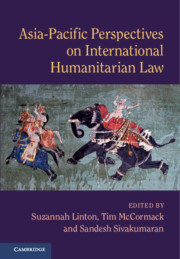Book contents
- Asia-Pacific Perspectives on International Humanitarian Law
- Asia-Pacific Perspectives on International Humanitarian Law
- Copyright page
- Contents
- Figures and Tables
- Contributors
- Foreword
- Foreword
- Acknowledgements
- Editors’ Note
- 1 Introduction: Asia-Pacific Perspectives on International Humanitarian Law
- Part I Interviews
- Part II Development of International Humanitarian Law
- Part III Practice and Application of International Humanitarian Law
- Part IV Implementation and Enforcement of International Humanitarian Law
- 28 International Humanitarian Law in the Indian Civilian and Military Justice Systems
- 29 Implementation of International Humanitarian Law Obligations in Australia: A Mixed Record
- 30 International Humanitarian Law in Indonesia
- 31 International Humanitarian Law in the Philippine Supreme Court
- 32 The Application of Grave Breaches at the Extraordinary Chambers in the Courts of Cambodia
- 33 The Application of International Humanitarian Law by the International Crimes Tribunals of Bangladesh
- 34 The Application of the Geneva Conventions in Nepal: Domestication As a Way Forward
- 35 Torture in Non-International Armed Conflict and the Challenge of Universal Jurisdiction: The Unsuccessful Trial of Colonel Kumar Lama
- Part V Looking to the Future and Enhancing Compliance with International Humanitarian Law
- Glossary of Publications
- Alphabetical Glossary of Cases and Decisions
- Chronological Glossary of Cases and Decisions
- Treaties and Other International Instruments, Resolutions and National Documents with an International Dimension
- Chronological Glossary of National Legislation and Secondary Instruments
- Peace Agreements and Communiques
- Abbreviations and Translations
- Index
33 - The Application of International Humanitarian Law by the International Crimes Tribunals of Bangladesh
from Part IV - Implementation and Enforcement of International Humanitarian Law
Published online by Cambridge University Press: 18 October 2019
- Asia-Pacific Perspectives on International Humanitarian Law
- Asia-Pacific Perspectives on International Humanitarian Law
- Copyright page
- Contents
- Figures and Tables
- Contributors
- Foreword
- Foreword
- Acknowledgements
- Editors’ Note
- 1 Introduction: Asia-Pacific Perspectives on International Humanitarian Law
- Part I Interviews
- Part II Development of International Humanitarian Law
- Part III Practice and Application of International Humanitarian Law
- Part IV Implementation and Enforcement of International Humanitarian Law
- 28 International Humanitarian Law in the Indian Civilian and Military Justice Systems
- 29 Implementation of International Humanitarian Law Obligations in Australia: A Mixed Record
- 30 International Humanitarian Law in Indonesia
- 31 International Humanitarian Law in the Philippine Supreme Court
- 32 The Application of Grave Breaches at the Extraordinary Chambers in the Courts of Cambodia
- 33 The Application of International Humanitarian Law by the International Crimes Tribunals of Bangladesh
- 34 The Application of the Geneva Conventions in Nepal: Domestication As a Way Forward
- 35 Torture in Non-International Armed Conflict and the Challenge of Universal Jurisdiction: The Unsuccessful Trial of Colonel Kumar Lama
- Part V Looking to the Future and Enhancing Compliance with International Humanitarian Law
- Glossary of Publications
- Alphabetical Glossary of Cases and Decisions
- Chronological Glossary of Cases and Decisions
- Treaties and Other International Instruments, Resolutions and National Documents with an International Dimension
- Chronological Glossary of National Legislation and Secondary Instruments
- Peace Agreements and Communiques
- Abbreviations and Translations
- Index
Summary
The International Crimes Tribunals (ICTs) of Bangladesh are exclusively national tribunals, operating under the International Crimes (Tribunals) (Amendment) Act (ICT Act 1973 (amended)). These high powered special international crimes tribunals have been prosecuting and punishing individuals who committed, directly or indirectly, crimes against humanity, genocide, war crimes, and other serious crimes under international law during the Bangladesh war of independence from March to December 1971. Since its establishment in 2010, ICT-1 has been continuing its functions but ICT-2, formed in 2012, functioned until 2015 when its functioning was suspended indefinitely.
- Type
- Chapter
- Information
- Asia-Pacific Perspectives on International Humanitarian Law , pp. 586 - 607Publisher: Cambridge University PressPrint publication year: 2019

